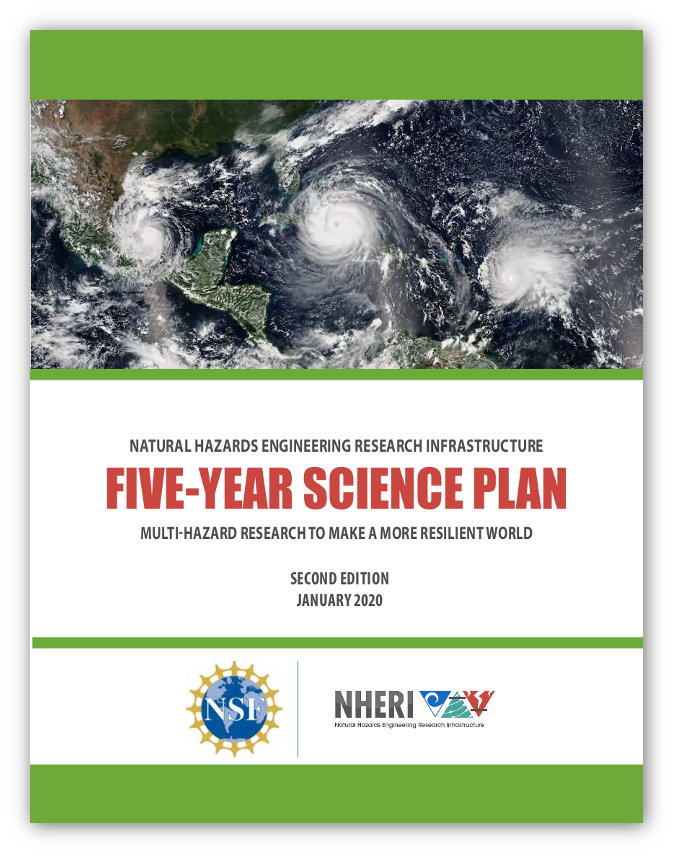FOR IMMEDIATE RELEASE
NSF-funded Science Plan for natural hazards mitigation released by NHERI
WEST LAFAYETTE, Jan. 13, 2020 According to the World Health Organization, natural disasters kill approximately 90,000 people each year. Nearly 160 million people worldwide are affected by the destruction caused by events such as hurricanes and storm surge, tsunamis, earthquakes and landslides.
A newly updated science plan, funded by the National Science Foundation, empowers research efforts to mitigate such devastating losses. The 2020 edition of the Five-Year Science Plan, spearheaded by NSF's Natural Hazards Engineering Research Infrastructure (NHERI), calls researchers across disciplines to solve the pressing problems that natural hazards present to communities in the U.S. and around the world.
Download the NHERI Five-Year Science Plan, Jan. 2020 edition.
High impact, high rewards
The NHERI Science Plan presents a roadmap for high-impact, high-reward, hazards engineering and interdisciplinary research at the NHERI research facilities. The plan aims to guide future research in the earthquake, wind, and coastal hazards research community, including NSF and other funding agencies.
"While the NHERI Science Plan is meant to provide guidance, it is also written in an open manner to ensure that the ingenuity and creativity of the broader community is fully encouraged," said Julio Ramirez, principal investigator for NHERI's Network Coordination Office. "We call on engineers and scientists to use the plan as a key resource in developing their grant proposals that seek to make our communities safer and more resilient against natural hazards."
Science plan structure, contributors
The plan is organized around three Grand Challenges, each with five Key Research Questions to guide NHERI research activities. This second edition of the plan, released today, incorporates community input received at meetings and workshops, from the NHERI-DesignSafe cyberinfrastructure and from participants in three summer institutes.
It also incorporates outcomes from the International Workshop to Develop Research Campaigns, Interdisciplinary Teams and Disruptive Technologies for the NHERI 5-Year Science Plan, which was held March 18-19, 2019, in Alexandria, Virginia. More than 70 researchers participated including early-career and senior academics from the U.S. and international universities. Contributors included federal partners, private sector professionals and NSF representatives. The workshop's objectives were twofold: (1) identify contributions from disruptive and transformational technologies to advance the NHERI Science Plan and the vision of NHERI and (2) develop potential research campaigns encompassing one or all of the natural hazards under the scope of NHERI. The research campaigns fall under the following themes:
- Earthquakes and Related Landslides: Resilience of Lifeline Systems
- Windstorms: Immediate Occupancy of Low-Rise Buildings Following Windstorms
- Preparation for Mega-disasters
- Storm Surge and Tsunami in Coastal Areas: Community-Level Management of Storm Surge and Tsunami Hazards
- Comprehensive Numerical Simulation Platform for Hurricanes and Tsunamis: from Source to Impact
In addition to the engineering community, the workshop highlighted contributions from social and behavioral scientists essential to advance the goals of the NHERI Science Plan to achieve resilient communities against natural hazards under the scope of NHERI.
"We are excited to welcome researchers and practitioners who are seeking to improve human lives and infrastructure to join our community and our efforts. The 2020 Science Plan provides valuable insights on the future of natural hazards research," said Ramirez.
Media Contacts:
Julio Ramirez, PhD
Director, NHERI Network Coordination Office
Karl H. Kettelhut Professor of Civil Engineering
Purdue University
765-494-2716
ramirez@purdue.edu
Billy Edge, PhD
Science Plan Lead
Professor Civil, Construction, and Environmental Engineering
North Carolina State University
979-229-3010
b-edge@tamu.edu
Join the NSF-supported NHERI community
Researchers in natural hazards are encouraged to join the NHERI community to learn more. The DesignSafe cyberinfrastructure supports research and educational efforts funded by NSF-NHERI grant awards and others. Join: designsafe-ci.org
About the Natural Hazards Engineering Research Infrastructure. Funded by the National Science Foundation (NSF), NHERI enables researchers to explore and test ground-breaking concepts to protect people and the places where they live from earthquakes, landslides, windstorms, tsunamis, storm surges, and waves â enabling innovations to help prevent natural hazards from becoming societal disasters. NHERI is a distributed, multi-user, national network that provides the natural hazards engineering and social science community with state-of-the-art research infrastructure ensuring that it has the well-coordinated testing and computational facilities required to meet the research challenges of the 21st century and achieve global leadership in natural hazard risk mitigation.








